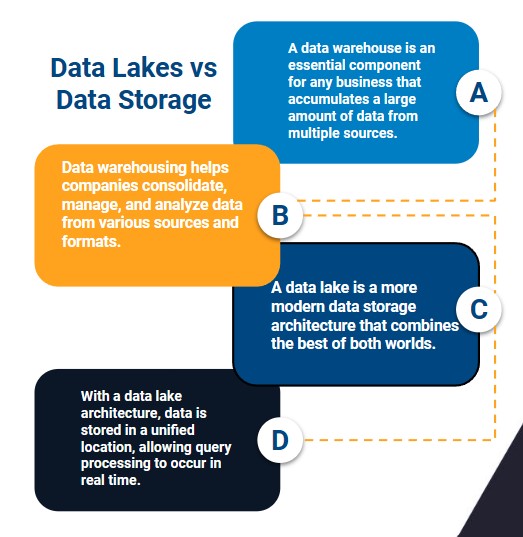
All software products, whether web pages or mobile applications, have one thing in common: they generate thousands of data points, which is why they require repositories or tools to manage them. Data lakes, in addition to the well-known data warehouses, are valuable for this.
What exactly is a data lake?
On the AWS portal, the word "data lake" is defined simply as "a centralized repository that allows you to store all of your structured and unstructured data at any scale. You can store your data without changing it or structuring it first. You can also use analytics to make better judgments, such as dashboards and visualizations, as well as massive data crunching, real-time analytics, and machine learning."
The data lake's greatest advantages are the extra functions it provides the user, such as different types of analysis from panels and big data processing, in addition to having artificial intelligence engines capable of being programmed and suitable for making decisions that favor data management and storage.

When a business requires a data storage tool
A data warehouse is a vital component for any company that collects significant amounts of data from many sources. It is required when a company has to extract considerable information, knowledge, and intelligence from a large volume of raw data.
Data warehousing assists businesses in consolidating, managing, and analyzing data from multiple sources and formats. This enables businesses to have a comprehensive view of their operations, assess trends, and detect patterns. It gives historical data, compares data from several sources, and provides a single source of truth for decision-making.
In general, a data warehouse is required when a company is dealing with vast amounts of data from different sources and needs to rapidly and effectively analyze this data to gain insights that assist drive growth and meet business goals.

Data Lake vs. Data Warehouse: A Comparison
A data warehouse is a consolidated, highly structured collection of historical data that is optimized for query and analysis. Data is structured according to a rigid schema, and data storage can be optimized for speedy queries and reports. A data warehouse is often populated by ETL (extract, transform, load) operations that transform and purify data before loading it into the data warehouse.
In contrast, a data lake is a more modern data storage design that combines the best of both worlds. It combines the advantages of a data lake (a centralized repository for storing unstructured and raw data) and a data warehouse (a structured repository suited for query and analysis). A data lake architecture stores data in a centralized location, allowing for real-time query processing. It helps enterprises to successfully handle unstructured data while offering business insights at the speed of a data warehouse.

The following are some important distinctions between the two ways of data storage:
- Data Storage and Structure: A data warehouse typically stores structured data in a relational database, but a data lake uses a combination of data lakes and data warehouses to store structured and unstructured data in its original format. data.
- Schema and flexibility: Data in a data warehouse is normally formatted using set, established schemas, but a data lake takes a more flexible approach, allowing data to be stored and analyzed as-is with schematic reading capabilities.
- Processing and analytics: Data warehouses typically use SQL-based processing and analytics, but data lakes provide a larger choice of processing and analytics alternatives, such as machine learning and big data tools such as Apache Spark, Apache Hadoop, and others.
- Cost: A data lake is typically less expensive than a data warehouse because it enables for large-scale data storage and analysis while incurring fewer expenditures for data transformation, schema design, and infrastructure maintenance.
- Data warehouses are often used for business intelligence, reporting, and analytics needs, whereas data lakes are largely utilized for data science, machine learning, and advanced analytics applications.
While the fundamental function of a Data Lakehouse and a Data Warehouse is to store and analyze data, the key distinctions between them are their flexibility, processing capabilities, storage structures, and cost.
We recommend you on video

